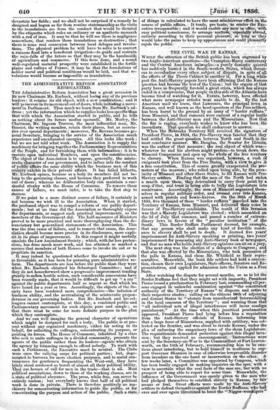THE ADMINISTRATIVE REFORM ASSOCIATION REORGANIZED.
'Inn Administrative Reform Association has a great accession in its new Chairman Mr. Roebuck, without losing any of its previous leaders : it retains its old object, with a new constitution; and it will persevere in its movement out of doors, while initiating a move- ment in Parliament. Thus much we learn.from Mr. Roebuck's ad- dress ; yet the information which he supplies looks less specifie than that with which 'the Association started in public, and he tells us nothing about its future moths operandi. 'Mr. Morley, the Chairman, Mi. Ingram Travers, the most influential man, Mr.
(haslet, the writing member, ' retain their places, but as secreta- ries over special departments ; moreover, Mr. Revans becomes ge- neral Secretary, bringing to the service of the Association much experience and unexhausted energies. All this looks like work; but we are not told what work. The Association is to supply the machinery for bringing together the Parliamentary Representatives of the People, and for furnishing them with information ; it is to ooppeerrate upon individual Members, and upon the constituencies. The object of the Association is to oppose, generally, the aristo- eratie-character of our government, and to infuse into the conduct of public afahc the same ability which the business men of this country exhibit in their private affairs. It has failed hitherto, Mr. Roebuck opines, because as a body its members did not be- long to the governing classes, and because they preferred to work out of doors ; whereas no' deliberative body can maintain a sue- Cessful rivalry with the House of Commons. To remove these causes of failure, we must infer, is to take the first step to
success: • - '
If we point to a more distinct source of failure, it certainly is not' because we- wish ill to the Association. When it' started, the professed object was to compel a reform of our public depart- ments; but at 'no time did the Association so thoroughly expose the departments, or suggest such practical improvements, as the members of the Government did. The half-measures of Ministers proved to be more practical and more thoroughgoing than the de- nunciatory but generalized statements of the Association. This was the true cause of failure, and to remove that cause, the Aaso- elation should become more precise in its disclosures, more expli- cit in its plans of improvement. In this respect it might usefully emulate the Law Amendment Society ; which, with far less preten- sions, has done much more work, and has attained so marked a success that members of both Houses come to invoke its aid or to
itiate its sanction.
It may indeed be questioned whether the opportunity is quite so favourable _as it has been for pursuing pure administrative re- form. The departments are less before the public than they were. When Mr. Roebuck obtained his Sebastopol Committee ' • and if they do not henceforward show a progressive improvement tending greatly to soften hostile action, such considerable concessions have been recently made, that it would be difficult to get up " a cry ". against the public departments half so urgent as that which wct have heard for a year or two. Accordingly, the objects of the So- ciety have been. rendered more comprehensive—the infusion of business ability, and the neutralizing of the aristocratic prepon- derance in our governing bodies. But Mr. Roebuck and his col- leagues cannot contemplate, at this day, a combined public and Parliamentary movement for such objects pure and simple ; so that there must be some far more definite purpose in the plan which they contemplate. And we can well imagine the general character of operations which might be designed for such a body. The public is at pre- sent without any organized machinery, either for acting in its• behalf, for collecting its suffrages' concentrating its purpose, or guiding its forces. The House of Commons, inhabited by a class who seek to unite suffrages in a divided community, presents the agents of the public rather than its leaders—agents who obtain the agency by trimming enough to offend nobody. To work with such a Parliament, the Executive must be neutral. The Clubs were once the rallying corps for political parties ; but, dege- nerated to bureaux for mere election purposes, and to social con- veniences for gentlemen frequenting the West-end, they have lately stood confessed as 'bereft of almost all their political utility. They are houses of call for men in the trade—that is all. Most political associations, down to those of the working classes, are in a state of political abeyance. The press, while free, can never be entirely useless ; but everybody knows that half of all political work is done in private. There is therefore positively no ma- chinery for concentrating information to guide the public, or for concentrating the purpose and action of the public, Such a state
of things 'is calculated to have the most mischievous effect on the course of public affairs. It tends, pro tante, to render the Exe- cutive irresponsible ; and it would enable any men in office, with easy political consciences, to arrange matters, especially abroad, entirely according to their personal pleasure, so long as they would take the pains to keep up appearances and could pleasantly cajole the public.


























 Previous page
Previous page